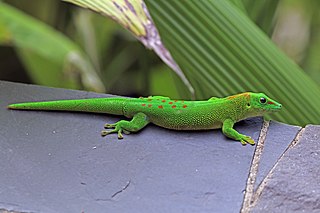
Phelsuma grandis is a diurnal arboreal species of day gecko. These geckos are part of the Phelsuma group, which consists of in excess of 70 species and subspecies. They are commonly referred to as the Madagascar giant day gecko, due to their large size. They are native to areas of tropical and subtropical forest in northern Madagascar, but have been introduced to several other subtropical locations outside their range. P. grandis feeds on various invertebrates, very small vertebrates, and nectars. It is bred and sold as an exotic pet.

The eastern lesser bamboo lemur, also known as the gray bamboo lemur, the gray gentle lemur, and the Mahajanga lemur is a small lemur endemic to Madagascar, with three known subspecies. As its name suggests, the eastern lesser bamboo lemur feeds mainly on bamboo. The lemurs of the genus Hapalemur have more manual dexterity and hand–eye coordination than most lemurs. They are vertical climbers and jump from stalk to stalk in thick bamboo forests.

The red-shouldered vanga is a member of the vanga family endemic to south-west Madagascar.

Adansonia madagascariensis or Madagascar baobab is a small to large deciduous tree in the family Malvaceae. It is one of six species of baobab endemic to Madagascar, where it occurs in the Madagascar dry deciduous forests.
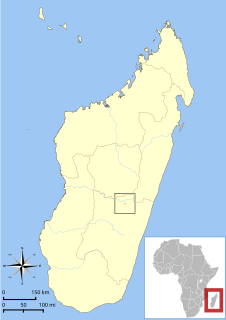
The lesser iron-gray dwarf lemur, or large iron-gray dwarf lemur, is a small nocturnal lemur endemic to Madagascar. It is nocturnal and an arboreal quadruped, and is not very agile. It produces three types of vocalisation: a squeak, which is high in pitch and is produced with the mouth closed, and is used between infants and their mothers; a whistle, which is higher in pitch than the squeak, so it is hard to hear with human ears, and is used as a communicative and possibly territorial call; and a grunt, which is usually given in series and is very powerful, used when an individual is being attacked in its nest.

Genoways's yellow bat is a species of vesper bat. It is found only in Mexico. It is threatened by habitat loss. Due to its imperiled status, it is identified by the Alliance for Zero Extinction as a species in danger of imminent extinction.

Aglyptodactylus madagascariensis is a species of frog in the family Mantellidae known commonly as the Madagascar jumping frog. It is endemic to Madagascar, where it has a wide distribution across the eastern side of the island. A. madagascariensis is a complex of various species which occur in different elevational ranges and different areas of Eastern Madagascar.

The Madagascar buzzard is a bird of prey which is endemic to Madagascar. It is a species from the widespread genus Buteo in the family Accipitridae.
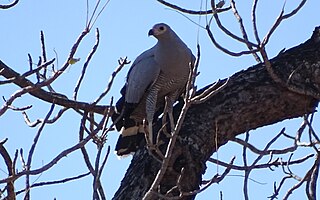
The Madagascar harrier-hawk is a very large species of bird of prey in the family Accipitridae, endemic to Madagascar.
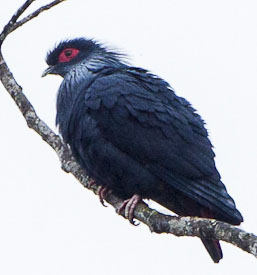
The Madagascar blue pigeon is a species of bird in the family Columbidae. The species is closely related to the other two extant species of blue pigeon, the Comoros blue pigeon and the Seychelles blue pigeon. It is endemic to northern and eastern Madagascar.

The scaly ground roller is a species of bird in a monotypic genus in the near-passerine family Brachypteraciidae. It is endemic to eastern Madagascar. Its natural habitat is subtropical or tropical moist lowland forest. The scaly ground roller is found at elevations below 1,000 meters (3,300 ft), and one of the few birds of Madagascar to reside in lowland rainforest.
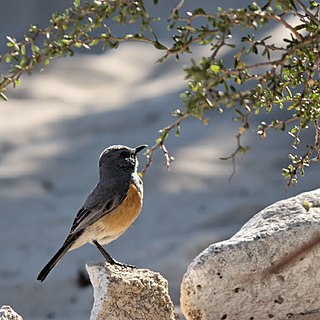
The littoral rock thrush, is a species of bird in the family Muscicapidae. It is endemic to Madagascar.

The Madagascar wagtail is a species of wagtail in the family Motacillidae. It is endemic to Madagascar.

The common newtonia is a species of bird in the family Vangidae. It is endemic to Madagascar.
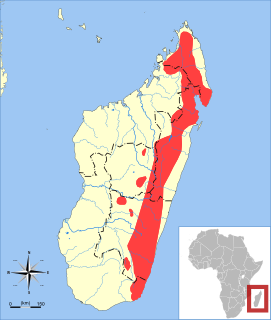
Dobson's shrew tenrec is a species of mammal in the family Tenrecidae. It is endemic to Madagascar. Its natural habitats are subtropical or tropical moist lowland forest, subtropical or tropical moist montane forest, plantations, and heavily degraded former forest. On the basis of molecular data indicating that it and Talazac's shrew tenrec form a sister group to the rest of Microgale, these two species were transferred from Microgale to Nesogale in 2016.
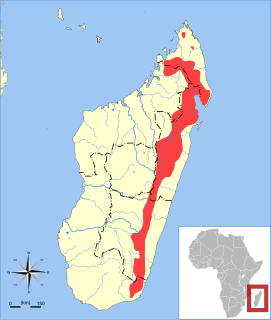
Talazac's shrew tenrec is a species of mammal in the family Tenrecidae. It is endemic to Madagascar. Its natural habitats are subtropical or tropical moist lowland forest and subtropical or tropical moist montane forest. It is threatened by habitat loss. On the basis of molecular data indicating that it and Dobson's shrew tenrec form a sister group to the rest of Microgale, these two species were transferred from Microgale to Nesogale in 2016.
The Siskiyou chipmunk is a species of rodent in the family Sciuridae. It is endemic to northern California and central Oregon in the United States.

The brown-tailed mongoose, brown-tailed vontsira, Malagasy brown-tailed mongoose, or salano is a species of mammal in the family Eupleridae. It is endemic to Madagascar. Its natural habitat is subtropical or tropical dry forests. It is threatened by habitat loss.
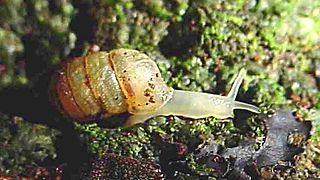
Streptaxidae is a family of carnivorous air-breathing land snails, terrestrial pulmonate gastropod mollusks in the clade Stylommatophora. Six Streptaxidae subfamilies are accepted in the 2005 taxonomy of the Gastropoda by Bouchet & Rocroi.
Petter's tufted-tailed rat is a rodent in the genus Eliurus found in lowland eastern Madagascar. First described in 1994, it is most closely related to the smaller Eliurus grandidieri. Virtually nothing is known of its natural history, except that it occurs in rainforest and is nocturnal and solitary. It is threatened by destruction and fragmentation of its habitat and is listed as "Vulnerable" on the IUCN Red List.



















